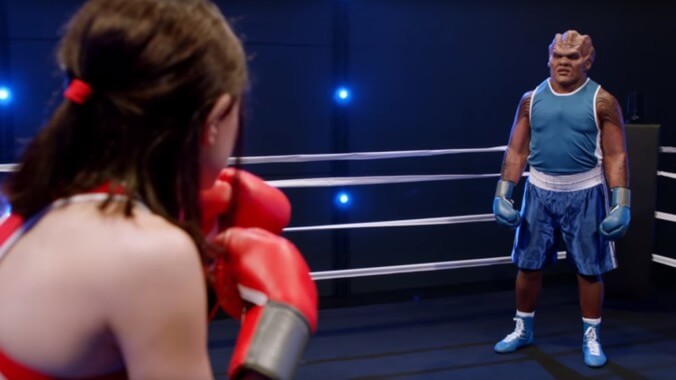Seth MacFarlane has been cagey about defining his show; unwilling to call it a comedy, he instead emphasizes The Orville’s dramatic foundation. Tonight’s episode, “About A Girl,” is the first episode to offer some legitimacy to his claim. The show is dedicated solely to the ramifications of the previous episode’s reveal that Bortus and Klyden have a baby girl, which occurs only once every 75 years. And while the central conflict is shaky, around the edges it yields surprisingly thoughtful character development that helps to make this the strongest episode to date.
As the episode begins, Bortus and Klyden are urgently making arrangements to procure the standard gender-reassignment surgery all female Moclans receive in order to conform to their all-male society. Unsurprisingly, as word of their plan gets out, the crew responds less than favorably to the tradition of performing an elective surgery on an otherwise healthy baby. Each crew member tries to shift Bortus’ position through the means they know best; Alara engages him in a meaty-sounding boxing match to prove women can bludgeon people to death just as good as men can. When that fails, Malloy and LaMarr play to their strengths and try to convince Bortus through the combination of beer and watching the 1964 Rankin/Bass production of Rudolph The Red-Nosed Reindeer. As is so often the case, delightful stop-motion antics win out where punching cannot, and Bortus has a change of heart. But Klyden doesn’t waver. In a reveal that doesn’t ultimately go anywhere, he confesses he was born female and underwent a sex change as a newborn. Unable to agree, the two travel to the Moclan home world to engage in that most delightful of sci-fi activities—a tribunal.
This is where the story arc gets bumpy. So far, the baby’s sex has been treated as a handicap, compared specifically to a cleft palate. The tribunal arguments against allowing the baby to remain female take on shades of anti-gay rhetoric, as well as old fashioned chauvinism. It’s not enough that she’ll have a disability; also she’ll be shunned because people are jerks, and also, women are gross. Science fiction is often in danger of disappearing up its own ass with involved, too-fussy lore, but “About A Girl” suffers from the opposite problem. We had a one-sentence reveal of the Moclans’ single-gendered status in the first episode, followed by the baby’s birth at the end of the second episode. Now, an entire episode is spent on the ramifications of her birth, but without knowing what it means for Moclan culture and history, it’s tough to understand why anybody feels the way they do. Have the Moclans always been men? After all, enough of them are born female that there’s a standard procedure dedicated to correcting it. Apparently, there’s entrenched prejudice surrounding being female, but if they’re virtually nonexistent, how does anyone have an opinion on what women are or aren’t capable of? Men are capable of getting pregnant and laying eggs, so what distinguishes the females of the species? The lack of any solid understanding about the species biology contributes (in part) to why the analogy feel so muddy and scattershot. In The Orville’s well-meaning attempt to land glancing blows against multiple kinds of discrimination, the story loses cohesion.
That said, the story included admirable narrative choices. In an apparent deus ex machina at the end of the trial, the Orville’s crew arrives with a famous Moclan literary hero who is revealed to be a woman. It’s the kind of well-worn device that’s supposed to make everyone reflect on their own prejudice and experience a mass change of heart. To the show’s credit, they do not. A single example—no matter how dramatic—is not enough to change the minds of an entire species’ ethos around a fundamental biological identity. And just as bold, there is no last minute escape or loophole to preserve the baby. Klyburn never changes his mind, Bortus quietly submits to the tribunal’s decision, and the baby undergoes the procedure.
This highlights the strongest aspect of this entire episode: Bortus and Klyburn’s relationship. Peter Macon and Chad L. Coleman have the unenviable task of handling all the emotional heavy lifting for the episode buried under layers of prosthetics, portraying members of a race of emotionally distant, deadpan aliens. But both actors perform admirably. It’s welcome to see how the partners maintain, even as they fundamentally disagree, their love for each other and their dedication to doing the best they can to raise a happy child. In all the ways The Orville strives to present an everyman approach to science fiction, depicting a couple that can face adversity but still maintain their connection to each other through it all is the best demonstration the show has given yet of living up to that promise.
Stray observations
- Norm McDonald briefly returns as Yaphit, faking an illness to try and score a date with Dr. Finn. His construction of a phallus tentacle to demonstrate his value as a partner was pretty disturbing.
- Art Corner: I love how most of the Moclan art we see are landscapes depicting some slight variation on the blighted industrialized surface of the Moclan homeworld.
- Fashion corner: As long as we’re talking about Moclans aesthetics and self-expression, I also enjoy their cascading hexagon medallions look.
- Science fiction gavels are the best. The Klingon gavel in Star Trek VI –a massive gauntlet with clawed fingers welded to a pockmarked metal ball- is still the gold standard, but the Moclan cube of titanium is pretty swell.
- If I had a matter replicator, I would make so many “Have a Slimy Day” pillows.
- “Nabisco!” “The Moon?” Malloy, attempting and failing to answer what was the capital of the United States of America.












![HBO teases new Euphoria, Larry David, and much more in 2026 sizzle reel [Updated]](https://img.pastemagazine.com/wp-content/avuploads/2025/12/12100344/MixCollage-12-Dec-2025-09-56-AM-9137.jpg)




























